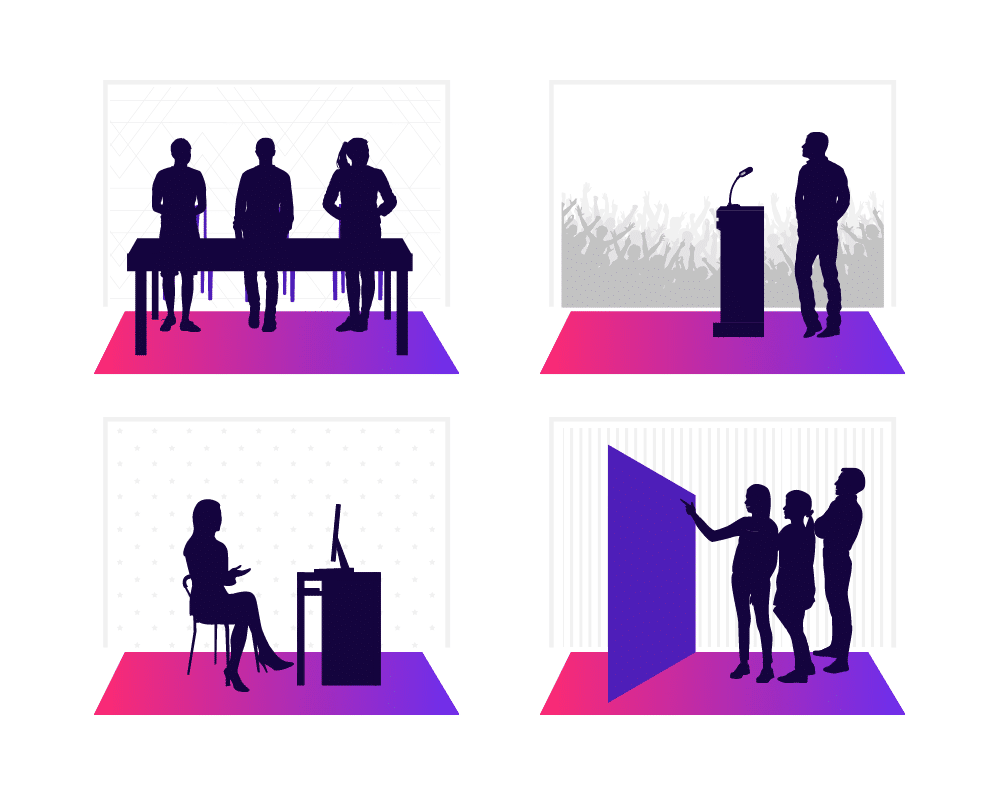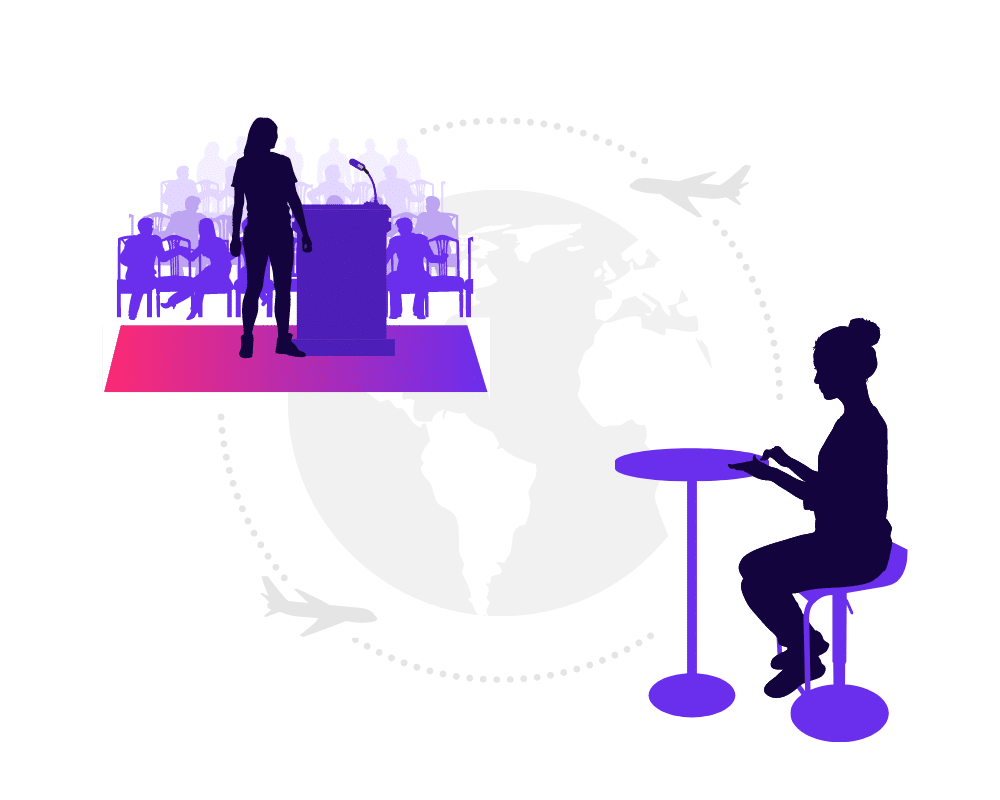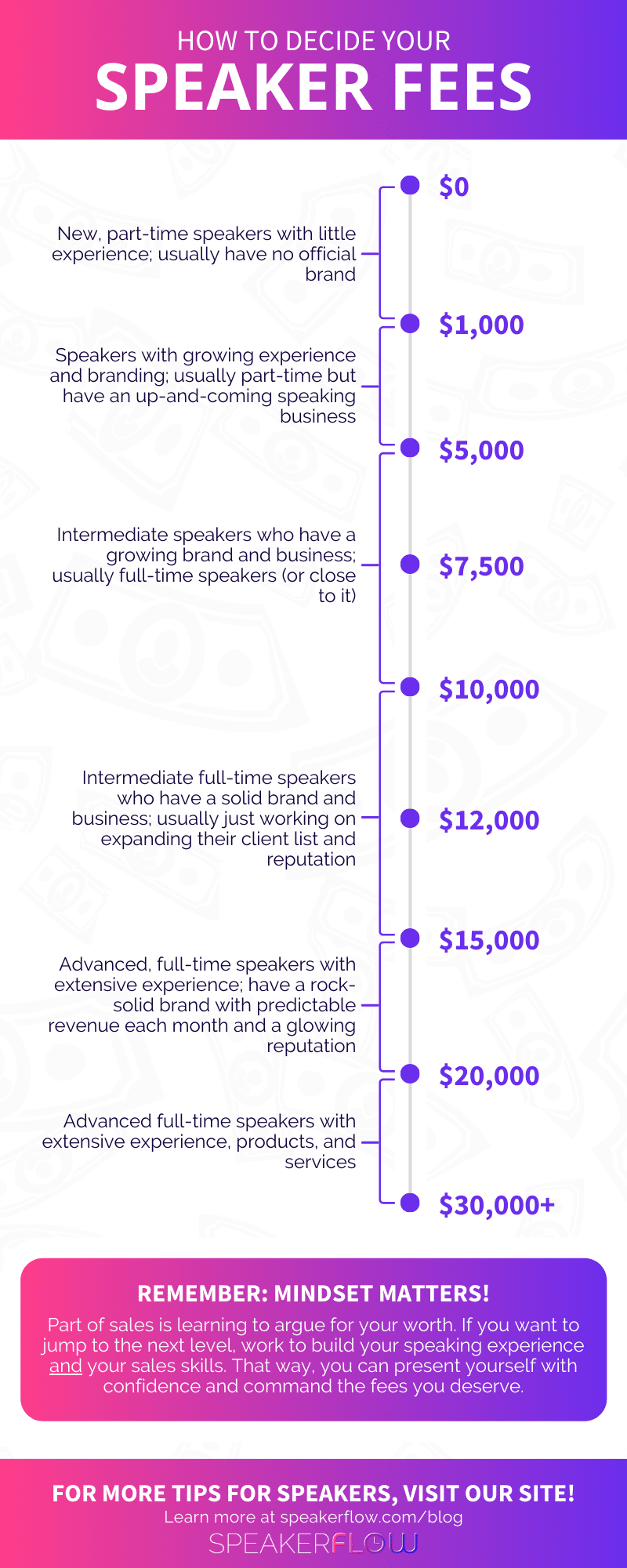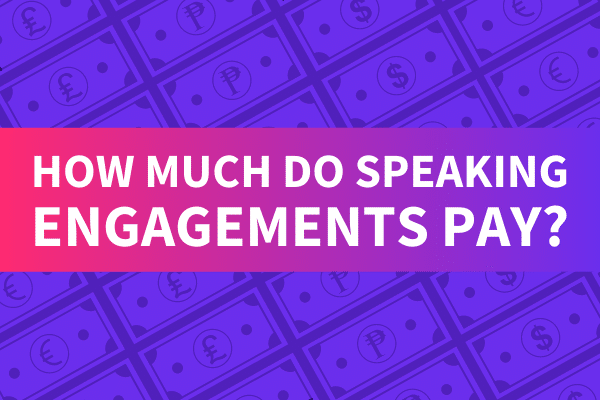For many aspiring speakers, a significant factor behind their decision to pursue a thought leadership career is revenue. Whether we’re talking the average fee per speaking gig, the average speaker’s income, or the number of “million-dollar speakers,” it’s no secret that professional speaking can be a lucrative business. This begs the question, for many up-and-coming speakers, “How much do speaking engagements pay?”
Put simply, speaking engagements can pay anywhere from a few thousand to more than $30,000 dollars. In many cases, a thought leader may initially speak for free in order to build their reputation. Then, as they build their credibility, their products and services, and their sales confidence, they’ll increase their fees accordingly.
If you’re at the beginning of this journey – or simply considering whether or not to pursue speaking in the first place – this guide is for you. Below, we’ll break down the most common speaking engagement fees and what warrants each one.
We’ll also cover the main questions to ask yourself when setting your speaking fees, either now or in the future. That way, you can approach the “money conversation” with confidence, and rest assured that you’re not selling yourself short. 👌
Common Speaking Fees
Overall, the answer to “How much do speaking engagements pay?” can range immensely. Depending on who you ask and how long you’ve been a speaker, you might hear “Don’t charge for your services yet” in response. Conversely, you might hear, “You’re charging what? You need to charge way more.”
Because of this variance, it can be difficult to pinpoint exactly what is the right fee for your speaking services. However, there are a few commonalities between speakers that have led to standard “ranges” of speaking fees. The following four ranges are relatively broad. But, nevertheless, they should give you an idea of where you fall compared to other speakers.
$0 – $5,000 Per Speaking Gig
The first range is from free speaking to about $5,000 per speaking engagement. Speakers in this category are in the early stages of their business and, generally, have not yet established a solid personal brand. Although their business – and reputation – may be growing quickly, these speakers are still in the process of building their list of clients, assembling their business systems, and refining their products and services. They’re also still finding out what sales offerings and techniques work for their audience, after which they can move on to the next fee range.
$5,000 – $10,000 Per Speaking Gig
The second range is from $5-10,000 per speaking engagement. Like those in the previous range, speakers in this category are building their speaking experience and confidence. However, unlike the previous range, these speakers have a firmer grasp of their business processes and a clearer understanding of how they can best serve their clients. In other words, while speaking businesses in this group are still evolving, they are – for the most part – well established and well organized. They mainly have to build their sales savvy, reputation, and determination to ask for higher fees.
$10,000 – $20,000 Per Speaking Gig
The third range is from $10-20,000 per speaking engagement. Speakers in this category are not only well established in the speaking industry but also well versed in what it takes to book speaking engagements. Unlike those in the previous two groups, these speakers aren’t focused on building the background of their business. Instead, their goal is to build their exposure in order to position themselves as an authority in their niche and, by extension, increase demand for their services. Once they’ve done this, they can charge even higher speaking rates.
$20,000+ Per Speaking Gig
That brings us to the fourth and final range: $20,000 or more per speaking engagement. For the most part, there are only a handful of things that allow speakers to reach this stage in their speaking business.
- First option: They’re a celebrity speaker, in which case their high fee is partly based on the size of the crowd they’ll attract. Examples include speakers like Jane Goodall, Temple Grandin, or Mel Robbins.
- Second option: They’re a well-known and respected authority in their niche. This includes speakers with decades of industry experience or prestigious awards (think the Nobel Prize, for example).
- Third option: They have a long list of high-profile clients, either from their original profession, their speaking career, or both. A good example of this is speaker and marketer Brittany Hodak, whose past client list includes Taylor Swift, Katy Perry, and a number of country music stars.
Obviously, you don’t have to fall under these labels to charge $20,000 or more per speaking engagement. In fact, there are many speakers who command these fees simply because of their stellar testimonials, streamlined businesses, and proven results.
In the long run, remember: Speaker fees are a spectrum. Even if you fall into the “$0 – $5,000 Per Speaking Gig” category today, how much you charge is ultimately up to you. Plus, testing the limits of your speaker fees, when pitching event planners, doesn’t make you greedy. If anything, it’s a necessary skill to learn as you build your confidence in sales conversations and increase the percentage of gigs that pay your full fee.
Keep that in mind when you decide how much to charge for your speaking engagements, and – above all – don’t undersell yourself. You deserve better than that! 💪
Questions To Consider When Setting Your Speaking Fees
All of this said, if you’re still wondering “How much do speaking engagements pay?” and unsure how much to charge, no worries! Although there are countless factors to consider when defining your fees, it essentially boils down to a few key questions. Below, you’ll find each of these questions, broken down in more detail, along with how they affect your fees.
Moving forward, ask yourself each one before you pitch event organizers. Even add them to the tasks list in your customer relationship management system, if that helps! With all of these questions, the goal is to build a habit of gauging your benefits with those of the event organizer. That way, you’ll eventually consider these factors without giving them a second thought and be able to confidently, efficiently adjust your fees in real-time, mid-conversation.
What kind of speaking event is it?
This refers both to the format of your presentation and whether the event is virtual or in-person. For the former, if the event is a high profile format – such as the opening or closing keynote – or if it’s time consulting – such as a workshop – consider a higher fee. On the flip side, if it’s less intense (and so has less of an impact on the total success of the event) consider a smaller fee. This applies to presentations like Q&A panels, which don’t require a ton of preparation.

To give you a better idea of what constitutes an intensive presentation, below is a list of some of the most common presentation formats, listed from least to most intensive.
- Panel/Q&A Session: You host a group of people to facilitate discussion around the given topic.
- Lecture: You conduct a presentation around the given topic. Excitement or motivational content is permitted but not required, making this format less intensive.
- Breakout Session: You conduct a presentation around the given topic, usually a sub-topic of the main event theme. Excitement or motivational content is usually encouraged.
- Keynote Speech: You deliver the opening or closing remarks, which establish the theme and tone of the event.
- Workshop: You facilitate exercises in real-time. These can be single or multi-day events and run longer than any of the aforementioned formats, making them the most intensive.
For the latter part of this question, you can charge the same fee for virtual and in-person versions of the same presentation. That said, as a general rule, virtual events tend to be priced lower than live ones. This is primarily because they’re more convenient for you, the event organizer, and the audience and because they can be riskier, in terms of ROI for the organizer.
To what extent do you have to customize your presentation(s)?
The answer to this question is simple: more customization equals higher fees. If you’re a new speaker, especially, make sure to highlight this as a reason for increased fees. No matter how much speaking experience you have, more customization may mean more value for them, but it also means more work for you. That warrants extra compensation.

If you don’t already offer customized solutions for your clients, below are a few ideas to inspire you. The list ranges from least to most expensive.
- Pre-Event Videos: You record videos prior to the event in order to promote it or provide a “sneak peek.” These can then be shared on the client’s newsletter, social channels, etc.
- Presentation: The content of your presentation stays the same, but your visual aids are rebranded to match the client’s brand.
- Educational Materials: Again, the content of these materials remains the same, but they’re rebranded to match the client’s brand.
- Books: The body text of your books stays the same, but the intro and cover are customized for the client. Speaker and sales trainer Phil Jones has a great example of this offering if you’d like to learn more.
How many people will attend the event?
This is another simple answer, regardless of your level of speaking experience: bigger audiences equal bigger fees. For any event, the event organizer is hiring you for the impact you’ll have on their audience. They’re also hiring you because they know you’ll ensure a positive outcome for their event, that they meet their goals. So, if you’re going to be having that impact and achieving those outcomes for more people, you deserve a higher fee.
Remind yourself, too, that this rule applies to virtual events as well as live ones. If your speech is going to be recorded, for example, and made available to the client’s employees for years after the event is over, that’s added audience members and added value to the client. With this in mind, always charge with the total event benefit in mind, not just the people who will see it live.
What (if any) post-event products or services are included in the contract?
For this question, consider all of the elements included in your speaking contract. Does your contract include a keynote alone, or are there added times – before and after the event – that you’ll need to be around? Every bit of time that you spend in service of the client is time worth being paid for, and more time-intensive services command higher fees. That includes:

- Social media promotion or interviews prior to the event
- Q&A or audience meet-and-greets after the event
- Post-event executive coaching or company-wide consulting
- Dinner with executives or games with attendees after the event
- Copies of your book or access to your educational materials pre- or post-event
For contracts with multiple components, include an itemized breakdown of their costs, but maintain your standard speaking fee. Additionally, if you want to make these kinds of contracts more appealing to potential clients, “pre-package” them yourself. That way, they can immediately identify with the package best suited to their needs, rather than trying to piece together one themselves.
Plus, by grouping different products and services together, you can give the illusion of a discount for customers without having to dramatically markdown your offerings or undersell yourself. It’s a win for you and for them!
How much travel is involved?
Again, the answer to this question is a simple one and goes back to convenience. Simply put, the less convenient a speaking engagement is (i.e. the more travel required), the higher your fee for that engagement.

Keep in mind that this applies only when you are including your travel costs as part of your fee. If the client wants to cover your travel costs separate from your speaking fee, you can ignore this factor. But, generally, we do recommend grouping the two costs together. Long term, it’s more convenient for the client, and you have more control over where you stay and how you get there.
If a client is concerned about the added cost of your travel, there are a few ways to reduce it.
- Offer them a virtual event instead of a live one. This isn’t always possible. But, if the client will look good on your resume, they’re an almost-sure sale, and they have a tight budget, this can win them over.
- Offer to speak when you’re already going to be in their area. Again, this depends on the flexibility of their schedule but does dramatically cut your travel costs.
- Negotiate a travel stipend. Sure, it may not allow you to stay where you would have normally, but the idea is to compromise. An example of this is flying economy instead of first-class or staying at a Hilton instead of the Radisson.
What benefits will the client see from your efforts?
There are tangible and intangible benefits from hiring a speaker, and chances are, the event organizer already knows this when they hire you. Knowing this, your speaking fees should reflect those benefits and the short and long-term results of your work.

Ultimately, you’ll need to think in terms broad and narrow. Ask yourself, “What benefits will the client see in the context of…”
- “Money? Are they reducing customer churn, for instance, and so saving more money? Or are they improving their sales skills and, as a result, making more money?”
- “Morale? Are their team members more engaged and less likely to look for other employment? Is there better communication among team members and between employees and leadership?”
- “Growth? Will your products and services help restart growth in their company? Will they accelerate existing growth?
- “Lifetime value? What will the impact of your work be one week after the event is over? One month? One year? Five years?”
To increase your fees even further, provide as much evidence as possible for these results. From testimonials to cold, hard numbers, the more proof you have for the positive effects of your products and services, the more event organizers will be willing to pay for them.
Conclusion
Although it’s not exhaustive, hopefully, this guide provides you with a solid foundation the next time you define your speaking engagement fee. For more information about speakers fees – and additional nuance behind the question, “How much do speaking engagements pay?” – check the previous guides linked below:
- How Much Should I Charge As A Speaker?
- The Ultimate Guide To Speaker Fees (With Fee Calculator)
- 7 Steps To Take If You Want To Charge Higher Speaking Fees
Furthermore, for additional guidance and cutting-edge resources, join SpeakerFlow University! It’s full of exclusive content, created by thought leaders for thought leaders. So, if you want to build your speaking fees to the max, you’re not alone. We – and your fellow speakers – have your back. 👍







